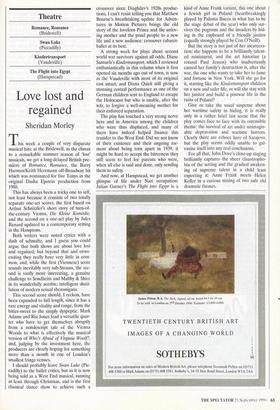Theatre
Romance, Romance (Bridewell) Swan Lake (Piccadilly)
Kindertransport (Vaudeville)
The Flight into Egypt (Hampstead)
Love lost and regained
Sheridan Morley
This week a couple of very disparate musical hits: at the Bridewell, as the climax to a remarkable summer season of 'lost' musicals, we get a long-delayed British pre- mi6re of Romance, Romance, the Barry Harman/Keith Herrmann off-Broadway hit which was nominated for filie Tonys in the original Dasha Epstein production from 1988.
This has always been a tricky one to sell, not least because it consists of two totally separate one-act scores, the first based on Arthur Schnitzler's short story of turn-of- the-century Vienna, Die Kleine Komodie, and the second on a one-act play by Jules Renard updated to a contemporary setting in the Hamptons.
Both writers were noted cynics with a dash of schmaltz, and I guess you could argue that both shows are about love lost and regained; but beyond that and cross- casting they really have very little in com- mon, and, while the first (Viennese) score sounds inevitably very sub-Strauss, the sec- ond is vastly more interesting, a genuine challenge to Sondheim and Maltby & Shire in its wonderfully acerbic, intelligent distil- lation of modern sexual shenanigans.
This second score should, I reckon, have been expanded to full length, since it has a rare energy and vitality and range, from the bitter-sweet to the simply dyspeptic. Mark Adams and Ria Jones lead a versatile quar- tet who have to get themselves abruptly from a nondescript tale of the Vienna Woods to what is effectively the musical version of Who's Afraid of Virginia Woolf, and, judging by the investment here, the producers are clearly hoping for something more than a month in one of London's smallest fringe venues.
I should probably leave Swan Lake (Pic- cadilly) to the ballet critics, but as it is now being sold as a West End musical, running at least through Christmas, and is the first classical dance show to achieve such a
crossover since Diaghilev's 1920s produc- tions, I can't resist telling you that Matthew Bourne's breathtaking update for Adven- tures in Motion Pictures brings the old story of the lovelorn Prince and the unlov- ing mother and the pond people to a new life and a new audience: crossover cabaret- ballet at its best.
A strong week for plays about second world war survivors against all odds. Diane Samuels's Kindertransport, which I reviewed enthusiastically in this column when it first opened six months ago out of town, is now at the Vaudeville with most of its original cast intact, and Diana Quick still giving a stunning central performance as one of the German children sent to England to escape the Holocaust but who is unable, after the war, to forgive a well-meaning mother for their enforced separation.
The play has touched a very strong nerve here and in America among the children who were thus displaced, and many of them have indeed helped finance this transfer to the West End. Did we not know of their existence and their ongoing tor- ment about being torn apart in 1939, it might be hard to accept the bitterness they still seem to feel for parents who were, when all else is said and done, only sending them to safety.
And now, at Hampstead, we get another glimpse of life under Nazi occupation: Julian Garner's The Flight into Egypt is a kind of Anne Frank variant, this one about a Jewish girl in Poland (heartbreakingly played by Paloma Baeza in what has to be the stage debut of the year) who only sur- vives the pogroms and the invaders by hid- ing in the cupboard of a friendly janitor (equally strongly played by Con O'Neill). But the story is not just of her incarcera- tion; she happens to be a brilliantly talent- ed miniaturist, and the art historian (a rotund Paul Jesson) who inadvertently caused her family's destruction is, after the war, the one who wants to take her to fame and fortune in New York. Will she go. for it, starting like the Kindertranspon children on a new and safer life, or will she stay with her janitor and build a postwar life in the ruins of Poland?
Give or take the usual suspense about her wartime ‘safety in hiding, it is really only in a rather brief last scene that the play comes face to face with its ostensible theme: the survival of art under unimagin- able depravation and wartime horrors. Clearly there are echoes here of Sarajevo, but the play seems oddly unable to gal- vanise itself into any real conclusions.
For all that, John Dove's close-up staging brilliantly captures the sheer claustropho- bia of the setting and the gradual awaken- ing of supreme talent in a child least expecting it: Anne Frank meets Helen Keller in a curious mixing of two safe old dramatic themes.


















































































 Previous page
Previous page